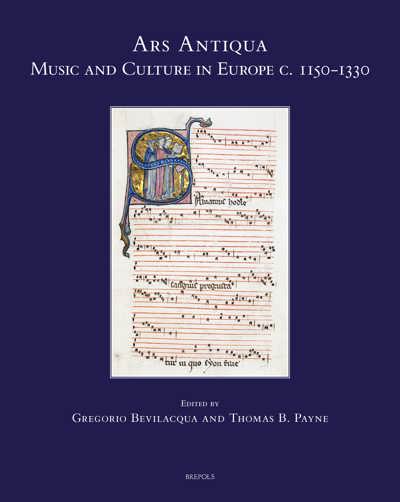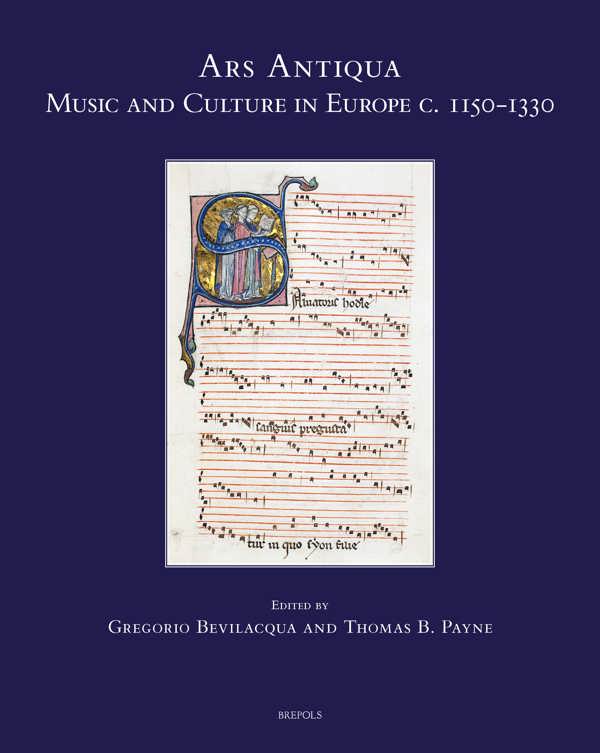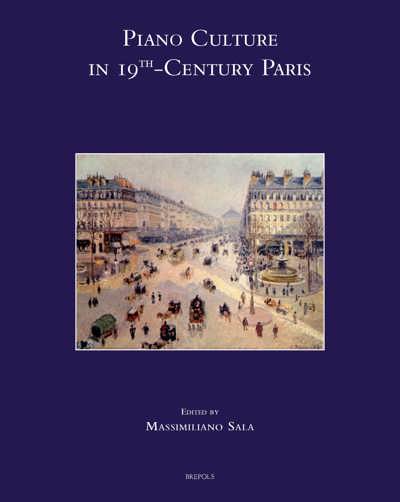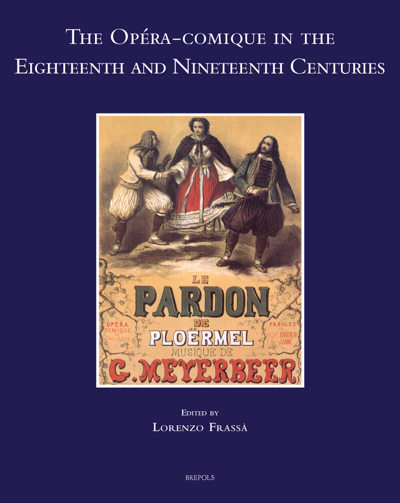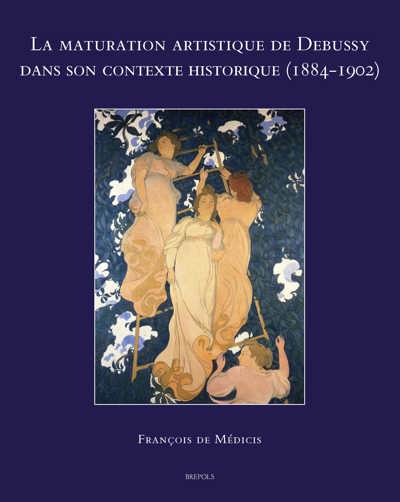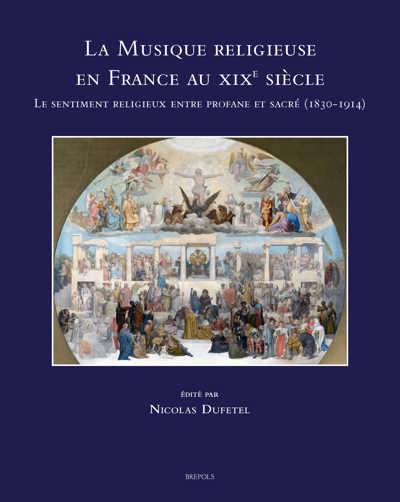
Ars Antiqua, Music and Culture in Europe c. 1150-1330
Gregorio Bevilacqua, Thomas Payne (eds)
- Pages: xviii + 318 p.
- Size:210 x 270 mm
- Language(s):English
- Publication Year:2021
- € 110,00 EXCL. VAT RETAIL PRICE
- ISBN: 978-2-503-59099-8
- Hardback
- Available
This volume presents new contributions that address the principal polyphonic genres of the time (organum, motet, conductus) as well as vernacular and monophonic songs, issues of musical and poetic aesthetics, manuscript tradition and production, authorship, liturgical practices, the continuance of «ars antiqua» ideas well into the fourteenth-century era of the «ars nova», and the role that information technologies may play in future «ars antiqua» scholarship.
“The volume itself is a handsome collection, with a handy bibliography at the end of each chapter. Bevilacqua and Payne have done an excellent job of bringing the essays together, especially in navigating the different scholarly traditions from which the essays originate… the volume is a must-read for anyone interested in the ars antiqua.” (Joseph W. Mason, in Music & Letters, 2022)
“This handsome volume is an important contribution to scholarship on the music of the long thirteenth century (…) The editors are to be commended for compiling consistently organized texts and music within an easy-to-use format (…) In addition to musicologists, students and scholars of literature, exegetics, and liturgy will find in this book deeply researched articles with well-reasoned results.” (Mary E. Wolinski, in The Medieval Review, 22/05/03)
“In short, the authors make exceptional contributions to the study of music in the long thirteenth century, and demonstrate the vitality of scholarship in this area. While the volume’s primary audience will be specialists, individual chapters will certainly be of pedagogical use as well. Each chapter is accompanied by extensive musical and textual examples, all beautifully set and easy to navigate. In addition, each chapter is immediately followed by its own appendices and bibliography, and therefore focusing on a single contribution — particularly in a teaching setting — can be done with ease. Taken as a whole, the volume offers researchers a treasure trove of new information and new ideas, and suggests that the ars antiqua will continue to provide fertile ground for novel scholarly approaches in future.” (Brianne Dolce, in Revue de musicologie, p. 471)
« (…) onze contributions, qui, ensemble, offre un aperçu des questions centrales de la recherche actuelle sur l’Ars antiqua. » (Manon Louviot, dans Le Moyen Âge, 3-4, 2022, p. 839)
Gregorio BEVILACQUA is a Senior Administrator at the Medical Research Council – Lifecourse Epidemiology Unit, Southampton University Hospital. He is a former Research Assistant at the Centre d'Études Supérieures de la Renaissance in Tours and Postdoctoral Research Fellow at the Department of Music of the University of Southampton, where he was the main curator of an online conductus database.
Thomas B. PAYNE is the David N. and Margaret C. Bottoms Professor of Music at William & Mary in Williamsburg, Virginia, in the United States. He has published articles on medieval music in the Journal of the American Musicological Society and Speculum, The Cambridge History of Medieval Music, and in the New Grove Dictionary of Music and Musicians among other places.
The long thirteenth-century saw the emergence and proliferation of a diverse and unprecedented outpouring of musical activity known as the «ars antiqua». Polyphonic, monophonic, liturgical, paraliturgical, secular, Latin, and vernacular genres were cultivated and disseminated throughout Europe on a scale not seen since the imposition of the liturgical plainchant repertory centuries earlier. This volume presents eleven new contributions that address the principal polyphonic genres of the time (organum, motet, conductus) as well as vernacular and monophonic songs, issues of musical and poetic aesthetics, manuscript tradition and production, authorship, liturgical practices, the continuance of «ars antiqua» ideas well into the fourteenth-century era of the «ars nova», and the role that information technologies may play in future «ars antiqua» scholarship. With its examination of musical and cultural contributions from all across Europe through a wide variety of different perspectives by a range of scholars from all over the globe, this book both contributes to and substantiates the healthy state of inquiry into one of the most significant artistic achievements of pre-modern Europe.
Gregorio Bevilacqua – Thomas B. Payne
Introduction
List of Cited Manuscripts
Gregorio Bevilacqua
The Production of Polyphonic Conductus.Collections in Ars Antiqua Manuscripts
Mary Channen Caldwell
Texting Vocality: Musical and Material Poetics of the Voice in Medieval Latin Song
Anne Ibos-Augé
Poetic and Melodic Recurrences in the Thirteenth-Century Refrain Repertoire
Kaho Inoue
Franco of Cologne, Ars cantus mensurabilis: Ligature, Notation and Mode
Matteo Macinanti
L’auditio del pulchrum musicale in Tommaso d’Aquino e Bonaventura da Bagnoregio
Nausica Morandi
The corpus of Sequences for Saint Anthony of Padua: A Study of the Musical Sources
Grace Newcombe
Britain’s Cleric Composers: Poetic Stress and Ornamentation in Worldes blis
Thomas B. Payne
Vetus abit littera: From the Old to the New Law in the Parisian Conductus
Anne-Zoé Rillon-Marne
Conductus sine musica: Some Thoughts on the Poetic Sources of Latin Songs
Jennifer Louise Roth-Burnette
Mapping Melodic Composition: A Metadata Approach to Understanding the Creation of Parisian Organum Duplum
Amy Williamson
Polyphonic Music in the British Isles c. 1300: Networks of Practice
Abstracts
Biographies
Index of Names
